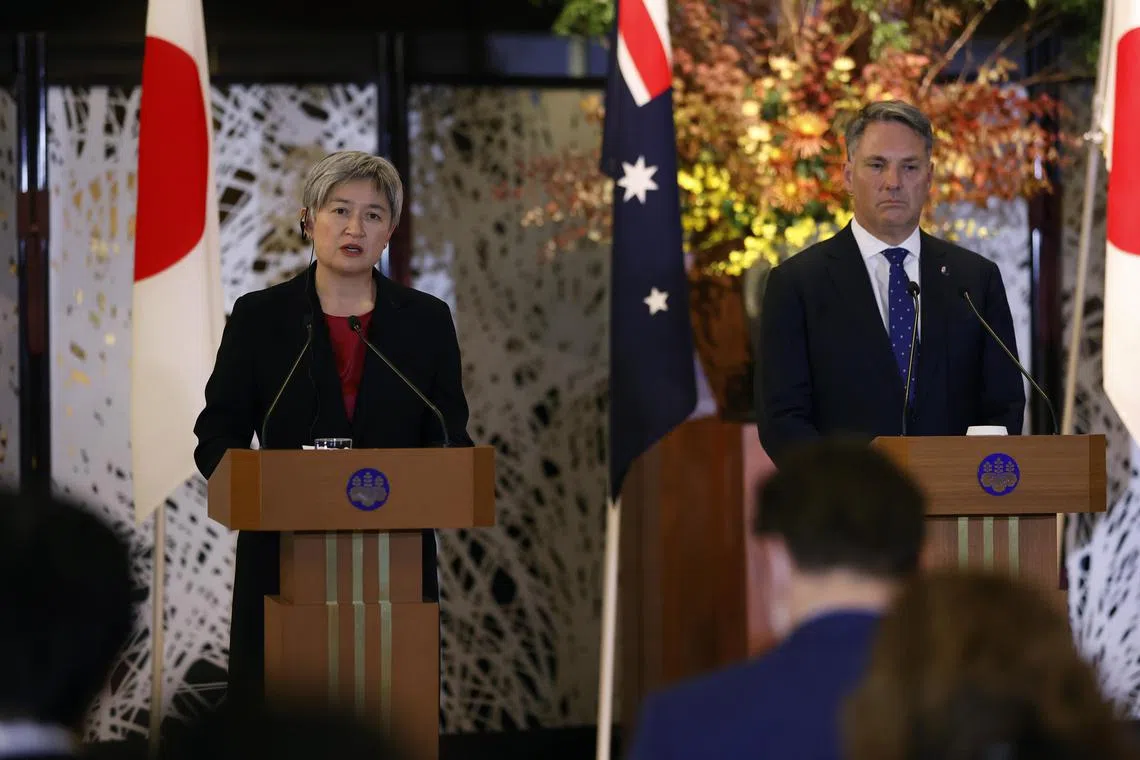Australia, Japan reaffirm Indo-Pacific commitment, military ties
Sign up now: Get insights on Asia's fast-moving developments

Australia's Foreign Minister Penny Wong (left) and Defence Minister Richard Marles at a joint news conference in Tokyo, on Dec 9, 2022.
PHOTO: EPA-EFE
HAMADA, Japan - Australia and Japan reaffirmed a commitment to a free and open Indo-Pacific region after a meeting of senior leaders in Tokyo.
The two nations agreed “to realise a shared vision for a free and open Indo-Pacific that is inclusive and resilient, where sovereignty and international law, including universal human rights, are upheld”, according to a communique published on Saturday in Sydney.
Australian Foreign Minister Penny Wong and Defence Minister Richard Marles met their respective Japanese counterparts, Mr Yoshimasa Hayashi and Mr Yasukazu Hamada, on Friday.
The nations agreed to “continuing effective and practical cooperation in the Pacific, including working within established Pacific architecture such as the Pacific Islands Forum, to address the needs and priorities of Pacific island countries”, according to the statement.
The work will include further collaboration to support infrastructure, connectivity and maritime security needs, it added.
The two nations also agreed to deepen security and defence cooperation, and build greater interoperability.
This will include unit exchanges and more complex exercises, including the possible deployment of F-35 fighter aircraft in either country.
Specifically, there will be consideration of “manoeuvre deployment training of Japan’s F-35s with an eye to future rotational deployment of Japan’s fighters including F-35s in Australia, while welcoming Royal Australian Air Force F-35s coming to Japan next year for the first time to participate in Exercise Bushido Guardian”.
And in Washington this week, the Australian and American defence and foreign ministers said they would welcome Japanese troops into three-way rotations.
Mr Marles said: “We’ve spent today thinking of ways in which we can operationalise that.”
He added that Australia was also “looking forward to ways in which, working with America, we can trilateralise that, and make that an effort where it is Australia, America and Japan working together across the three domains” of land, sea and air defence.
The United States has been rotating marines since 2011 through the strategic city of Darwin in northern Australia.
Japanese Defence Minister Yasukazu Hamada did not comment directly on the invitation to participate in trilateral operations in Australia.
He only stated that “for our defence and security, the cooperation between Australia and Japan, together with that of our ally the United States and other like-minded countries, is of vital importance”.
Japan, a treaty-bound ally of the US, has in recent years sought growing diplomatic cooperation with Australia, but defence ties have been more sensitive due to the Japanese constitution, which limits Tokyo’s military capacity to ostensibly self-protective measures.
But Japan is preparing to announce an overhaul of its security strategy, including plans to ramp up defence spending by more than 50 per cent over five years. BLOOMBERG, AFP


